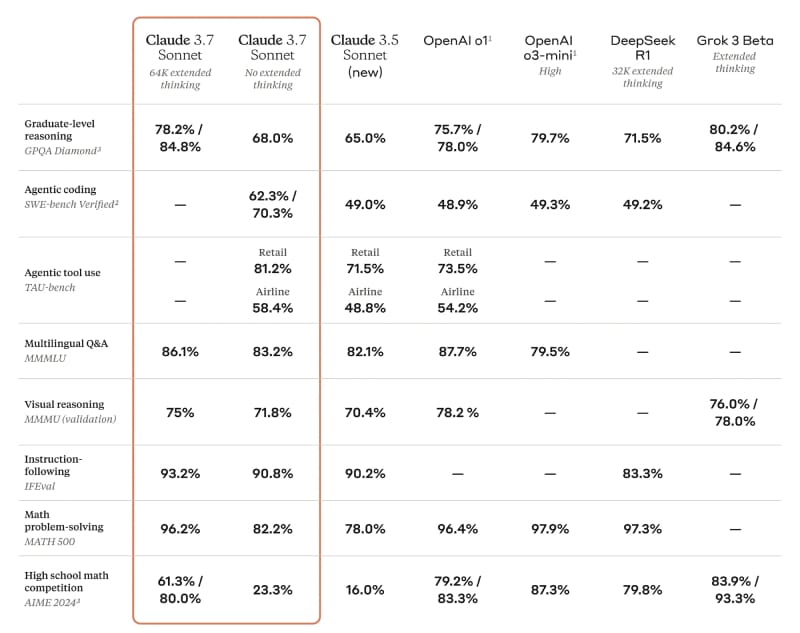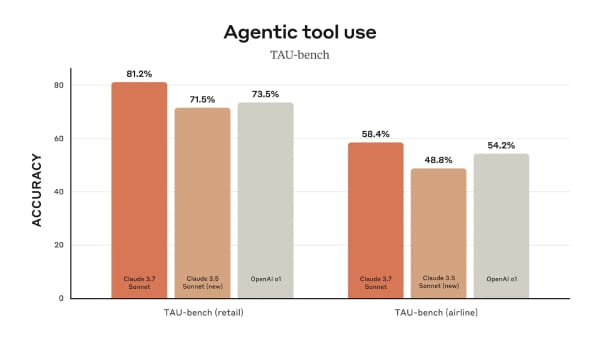Anthropic has launched Claude 3.7 Sonnet, a groundbreaking hybrid reasoning AI model that combines advanced logic, coding prowess, and domain-specific expertise for tasks ranging from financial analysis to legal document review. Paired with the release is Claude Code, an agentic coding assistant designed to revolutionize developer workflows by integrating code editing, testing, and deployment into a single AI-driven platform.
Why Claude 3.7 Sonnet is a Game-Changer in AI
1. Advanced Hybrid Reasoning Engine
Claude 3.7 Sonnet leverages symbolic-subsymbolic AI integration, enabling it to solve multi-step problems like travel planning (“Plan a two-week Italy trip with weather adjustments”) or iterative coding tasks. Outperforming its predecessor, Claude 3.5 Sonnet, it achieves 15-20% higher accuracy in math, coding benchmarks, and real-world applications such as debugging codebases for 45+ minutes.

2. Claude Code: The Autonomous Developer Partner
Unlike traditional AI coding tools, Claude Code operates as a self-sufficient collaborator:
- Search & Edit Codebases
- Run Automated Tests
- Commit Changes to GitHub
- Execute Command-Line Operations
Developers can now streamline workflows without switching between platforms, reducing project timelines by up to 30% in internal Anthropic tests.
3. Cost Efficiency & Customization
Priced at $3 per million input tokens and $15 per million output tokens, Claude 3.7 Sonnet matches its predecessor’s cost while delivering superior performance. Unique features like response-time controls (as low as 200ms) and a reasoning scratchpad allow developers to tailor the AI’s problem-solving approach.
4. October 2024 Knowledge Base
With a training data cutoff of October 2024, Claude 3.7 Sonnet offers fresher insights than competitors, despite lacking real-time web search. This makes it ideal for time-sensitive industries like finance and law.
Proven Performance & Practical Use Cases

- Coding Mastery: Built front-end interfaces and interactive games during internal testing.
- Gaming Intelligence: Outperformed Claude 3.5 Sonnet in navigating Pokemon games, defeating gym leaders where the older model stalled.
- Ethical AI Design: Prioritizes transparency and safety, contrasting with rivals focused solely on speed.
The Shift Toward Unified AI Models
While competitors like OpenAI deploy specialized reasoning systems, Anthropic advocates for all-in-one AI frameworks. Claude 3.7 Sonnet exemplifies this vision:
- Simple Queries: Instant responses to “What time is it?”
- Complex Tasks: Detailed solutions for prompts like “Optimize a cloud infrastructure budget.”
Industry analysts highlight this release as a tipping point, signaling the end of fragmented AI tools and the rise of general-purpose models capable of handling diverse workloads.
Conclusion: Balancing Innovation with Responsibility
Claude 3.7 Sonnet represents a monumental leap in hybrid reasoning AI, offering developers and enterprises unmatched problem-solving versatility, cost efficiency, and ethical safeguards. From streamlining coding workflows with Claude Code to mastering complex tasks like financial analysis, Anthropic’s latest model sets a new benchmark for general-purpose AI systems.
However, as AI capabilities grow exponentially, addressing broader societal implications is critical. While tools like Claude 3.7 Sonnet promise productivity gains, the rapid evolution of AI also raises questions about job displacement, bias amplification, and ethical oversight. For a deeper dive into these challenges, explore our analysis of the negative impacts of artificial intelligence on society—a must-read for understanding the dual-edged nature of AI advancements.
Anthropic’s focus on transparency and unified reasoning models offers a blueprint for responsible innovation. By prioritizing ethical AI development alongside technical prowess, the industry can harness tools like Claude 3.7 Sonnet to drive progress while mitigating risks. The future of AI isn’t just about smarter models—it’s about building systems that benefit humanity holistically.


